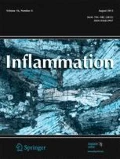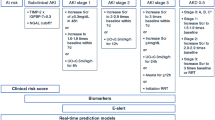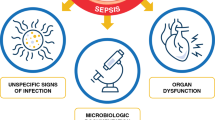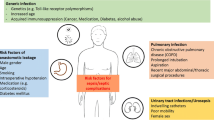Abstract
To investigate patients with severe acute pancreatitis (SAP) by dynamic levels of pro-/anti-inflammatory cytokines and endotoxin (ET) in plasma and the relationship between immunity and infection, organ dysfunction. Seventy-two patients with SAP were recruited. The ET, tumor necrosis factor-α (TNF-α), interleukin-6 (IL-6), interleukin-10 (IL-10), and interleukin-4 (IL-4) were determined on admission and days 3, 7, and 14. For comparison, patients were analyzed through infection group versus non-infection group, multiple organ dysfunction syndrome (MODS) group versus non-MODS group. There were sixteen patients with secondary infection, twenty-two with MODS, and nine deaths. The infection group had higher levels of ET than the non-infection group on days 3 and 7. The dynamic cytokine levels of patients in the MODS group were unanimous with those outcomes in the infection group. The levels of cytokines in the infection group were different from the non-infection group, with more levels of TNF-α, IL-6 on days 3 and 7 and less on days 14, and more levels of IL-10, IL-4 on days7 and 14. The levels of TNF-α, IL-6 in the MODS group were different from the non-MODS group, with more levels on days 3 and 7, and less levels on days 14. Immune dysregulation may play an important role in infection and organ dysfunction for patients with SAP.
Similar content being viewed by others
References
Bumbasirevic, V., D. Radenkovic, Z. Jankovic, et al. 2009. Severe acute pancreatitis: overall and early versus late mortality in intensive care units. Pancreas 38: 122–125.
Braganza, J.M. 2001. Towards a novel treatment strategy for acute pancreatitis. 1. Reappraisal of the evidence on aetiogenesis. Digestion 63: 69–91.
Mizuguchi, T., M. Mukaiya, H. Imaizumi, et al. 2004. Successful management of severe acute pancreatitis with multiple organ failure. Pancreas 28: 211–213.
Beger, H.G., B. Rau, and R. Isenmann. 2003. Natural history of necrotizing pancreatitis. Pancreatology 3: 93–101.
Büchler, M.W., B. Gloor, C.A. Müller, et al. 2000. Acute necrotizing pancreatitis: treatment strategy according to the status of infection. Annals of Surgery 232: 619–626.
Tsui, N.C., E. Zhao, Z. Li, et al. 2009. Microbiological findings in secondary infection of severe acute pancreatitis: a retrospective clinical study. Pancreas 38: 499–502.
Heinrich, S., M. Schäfer, V. Rousson, et al. 2006. Evidence-based treatment of acute pancreatitis: a look at established paradigms. Annals of Surgery 243: 154–168.
Balog, A., Z. Gyulai, L.G. Boros, et al. 2005. Polymorphism of the TNF-alpha, HSP70-2, and CD14 genes increases susceptibility to severe acute pancreatitis. Pancreas 30: e46–e50.
Zhang, X.P., H.Q. Chen, F. Liu, et al. 2009. Advances in researches on the immune dysregulation and therapy of severe acute pancreatitis. Journal of Zhejiang University. Science. B 10: 493–498.
Bradley 3rd, E.L. 1993. A clinically based classification system for acute pancreatitis. Summary of the International Symposium on Acute Pancreatitis, Atlanta, Ga, September 11 through 13, 1992. Archives of Surgery 128: 586–590.
American College of Chest Physicians/Society of Critical Care Medicine Consensus Conference: definitions for sepsis and organ failure and guidelines for the use of innovative therapies in sepsis. Critical Care Medicine 1992;20: 864–874.
Xia, S.H., C.X. Hu, J.M. Fang, et al. 2008. G[alpha] i2 and G[alpha] q expression change in pancreatic tissues and BN52021 effects in rats with severe acute pancreatitis. Pancreas 37: 170–175.
Makhija, R., and A.N. Kingsnorth. 2002. Cytokine storm in acute pancreatitis. Journal of Hepato-biliary-pancreatic Surgery 9: 401–410.
Zhang, X., L. Chen, L. Luo, et al. 2008. Study of the protective effects of dexamethasone on ileum mucosa injury in rats with severe acute pancreatitis. Pancreas 37: e74–e82.
Holmes, C.L., J.A. Russell, and K.R. Walley. 2003. Genetic polymorphisms in sepsis and septic shock: role in prognosis and potential for therapy. Chest 124: 1103–1115.
Rahman, S.H., G. Salter, J.H. Holmfield, et al. 2004. Soluble CD14 receptor expression and monocyte heterogeneity but not the C-260 T CD14 genotype are associated with severe acute pancreatitis. Critical Care Medicine 32: 2457–2463.
de Madaria, E., J. Martínez, L. Sempere, et al. 2008. Cytokine genotypes in acute pancreatitis: association with etiology, severity, and cytokine levels in blood. Pancreas 37: 295–301.
Beger, H.G., and B.M. Rau. 2007. Severe acute pancreatitis: clinical course and management. World Journal of Gastroenterology 13: 5043–5051.
Ammori, B.J., P. Fitzgerald, P. Hawkey, et al. 2003. The early increase in intestinal permeability and systemic endotoxin exposure in patients with severe acute pancreatitis is not associated with systemic bacterial translocation: molecular investigation of microbial DNA in the blood. Pancreas 26: 18–22.
Liu, H., W. Li, X. Wang, et al. 2008. Early gut mucosal dysfunction in patients with acute pancreatitis. Pancreas 36: 192–196.
Büchler, M.W., B. Gloor, C.A. Müller, et al. 2000. Acute necrotizing pancreatitis: treatment strategy according to the status of infection. Annals of Surgery 232: 619–626.
Tellado, J.M. 2007. Prevention of infection following severe acute pancreatitis. Current Opinion in Critical Care 13: 416–420.
Osman, M.O., B. Gesser, J.T. Mortensen, et al. 2002. Profiles of pro-inflammatory cytokines in the serum of rabbits after experimentally induced acute pancreatitis. Cytokine 17: 53–59.
Matsuda, N., J. Nishihira, Y. Takahashi, et al. 2006. Role of macrophage migration inhibitory factor in acute lung injury in mice with acute pancreatitis complicated by endotoxemia. American Journal of Respiratory Cell and Molecular Biology 35: 198–205.
Liu, H.B., N.Q. Cui, Q. Wang, et al. 2008. Sphingosine-1-phosphate and its analogue FTY720 diminish acute pulmonary injury in rats with acute necrotizing pancreatitis. Pancreas 36: e10–e15.
Ohmoto, K., and S. Yamamoto. 2005. Serum interleukin-6 and interleukin-10 in patients with acute pancreatitis: clinical implications. Hepato-Gastroenterology 52: 990–994.
Ueda, T., Y. Takeyama, T. Yasuda, et al. 2006. Immunosuppression in patients with severe acute pancreatitis. Journal of Gastroenterology 41: 779–784.
Rau, B.M., C.M. Krüger, C. Hasel, et al. 2006. Effects of immunosuppressive and immunostimulative treatment on pancreatic injury and mortality in severe acute experimental pancreatitis. Pancreas 33: 174–183.
Shi, C.B., X. Zhao, A. Lagergren, et al. 2006. Immune status and inflammatory response differ locally and systemically in severe acute pancreatitis. Scandinavian Journal of Gastroenterology 41: 472–480.
Bone, R. 1996. Toward a theory regarding the pathogenesis of the systemic inflammatory response syndrome: what we do and what we do not know about cytokine regulation. Critical Care Medicine 24: 163–172.
Acknowledgment
This work was supported by the National Science and Technology Support Program of China (grant no. 2006BAI04A15). We thank all the volunteers.
Author information
Authors and Affiliations
Corresponding author
Additional information
None of the authors have identified a conflict of interest, and the material was not presented at any annual meetings and journals.
Rights and permissions
About this article
Cite this article
Shen, Y., Cui, N., Miao, B. et al. Immune Dysregulation in Patients with Severe Acute Pancreatitis. Inflammation 34, 36–42 (2011). https://doi.org/10.1007/s10753-010-9205-4
Published:
Issue Date:
DOI: https://doi.org/10.1007/s10753-010-9205-4




